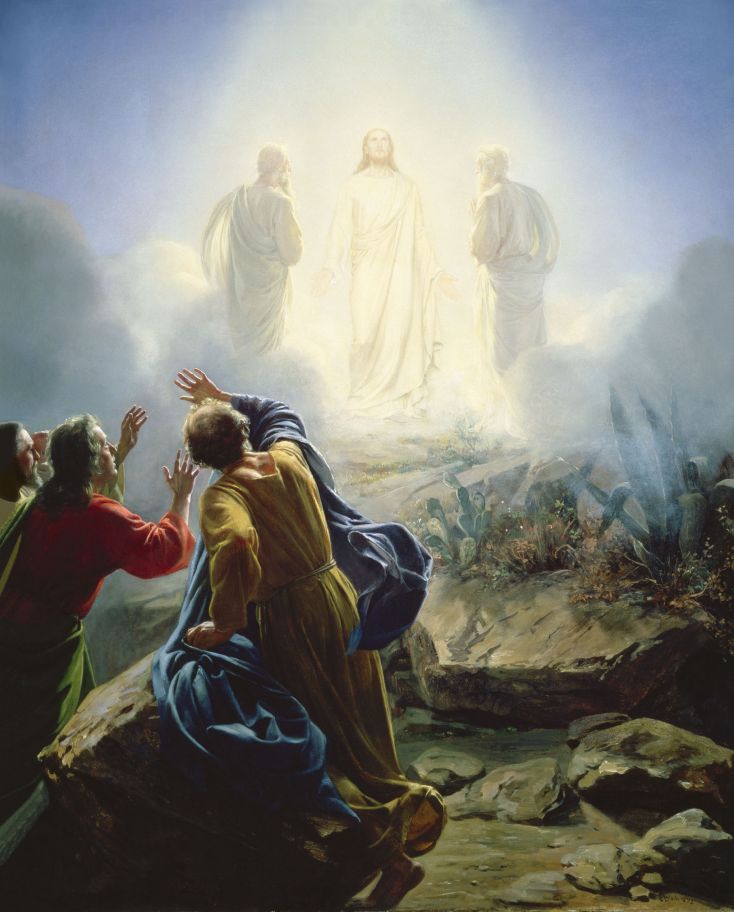grace
Grace: God’s Free Gift

4th Sunday of Lent
Fr. Mark Gatto
Preached: March 10, 2024
Sometimes I feel like an atheist. When I see or hear the way some Christians speak of God, I think to myself, I do not believe in such a god. If you were speaking to someone about God and could use only one word, what would you choose?
No word really captures the mystery that is God. Human language always falls short. But, we need words to point us to that mystery, to keep us awake to the mystery of God.
One word found in the readings today is the word, Grace. St. Paul says that “it is by grace that you have been saved.” Paul speaks of the “immeasurable riches of his grace.” Grace is free gift. It is unearned. Paul says that we are saved through faith and this grace is “the gift of God.” We do not earn or deserve this grace of God.
Yet, at times we act as though we can earn or deserve grace. Someone will say, I go to Mass every Sunday, I have not committed any serious sin, I pray regularly, therefore God should reward me, things should go well in my life. But, love is grace, it is free gift, or it is not love at all. Love is only true if it is freely offered and freely received.
We cannot bribe God. God does not demand a bribe from us. We are loved in grace that is free gift. We heard that famous passage from John’s Gospel, chapter 3. “For God so loved the world that he gave his only begotten Son, so that everyone who believes in him may not perish but may have eternal life.” It goes on to say, “God did not send the Son into the world to condemn the world, but in order that the world might be saved through him.” Why are we so fearful at times expecting that we will be condemned. God’s will is our salvation.
Where do we find grace? God is not something in the universe, not one being among things in the universe. God is the grounding of all in the universe. God is holding all that exists in this universe. There is no place where we can go where we are unable to experience the grace of God. Sometimes people think, I am too great a sinner, I am not praying enough, I have too serious a failing in my past.
There is no environment, no place in which the grace of God is not present. We just need to open our eyes. But, as Jesus says, sometimes people love the darkness rather than the light. Have you ever encountered a family member or friend who has taken a dark turn in life. Someone married who has become involved in an adulterous relationship, someone who is being greedy and fighting over a will, or someone who has gone down a harmful path with alcohol or drugs. You might try to speak to that person and shed light on the wrong path they are on. But, often they prefer to remain in the dark and so avoid the light.
Each of us need self awareness, to be utterly honest with ourselves in letting light to face any darkness in our lives. Honesty with myself is crucial, to live in light not darkness.
Grace is all around you. It is free gift being offered by God. God desires your salvation. Each day give thanks that you are loved. Honestly face any ways that are keeping you in darkness, unable to see the immeasurable riches of the grace of God.
When we are speaking of God or sharing our faith with others, hopefully others will experience grace, the utterly free gift of God’s love.
Seeing Grace In The Ordinary

Second Sunday of Lent
Fr. Mark Gatto
Preached: March 17, 2019
The great test of our Catholic Faith is not that we can perform miracles or healings. The great test is that we have a sense of wonder and awe, that we are able to see grace in the most ordinary places. Are we able to recognize grace in ordinary places, people, moments?
We just heard the story of the Transfiguration. Peter, James and John on that mountain with Jesus see his glory, recognize the deeper meaning of Jesus, see the inner reality of Jesus as Son of the Father. Important in this story is to remember that Jesus was fully human like us. He looked like us, someone meeting or seeing him would see a human being like any other. Jesus was a completely ordinary human being. There would be nothing extraordinary just looking at him.
But, in the Transfiguration experience, Peter and James and John see something more, they
recognize the glory of Jesus, saw the divine reality present in their midst. In this ordinary human being, they were able to see with wonder the grace present in Jesus.
The four Gospels that we have are not primarily historical accounts. They are faith accounts and anything expressed in the Gospels is meant to become real in our lives as well. If the Gospels are not lived in our lives then they simply become dead letters.
So, the important question is not, “did the Transfiguration happen?” nor the question “what happened there?” The more important question for us is, “where and how do I experience the Transfiguration today in my life?”
Where do we see grace in the ordinary, where do we see beyond the ordinary to a deeper mean-ing? Are we able to see with eyes of wonder, to see the grace in the ordinary things, places and people in our life?
Marriage. One of the difficulties for some newly married couples is that they have false expectations. So, they are unable to see the grace and goodness in their very ordinary spouse and very ordinary marriage. Sometimes people struggle because their marriage is too ordinary, their spouse is too ordinary. The challenge is to be able to see with the eyes of wonder, to recognize grace in that very ordinary spouse, grace in your very ordinary marriage.
Same challenge exists for many new priests. They come out all excited, but most people they serve are very ordinary and the parish they serve is very ordinary. The challenge for a priest is to see with the eyes of wonder, to see the grace in the ordinary people they serve, see the grace in the ordinary parish they are in.
Another place we need to see with the eyes of wonder is when we look to the poor, the home-less, the sick. At first sight we might only see that they are rough, dirty, smelly. Are we able to see the grace below that surface? To recognize even the presence of Christ in the poor and needy?
Seeing with eyes of wonder, the grace in the ordinary is our Catholic Sacramental vision. This Catholic Sacramental Vision is experienced in the Sacraments. In very ordinary things we see something greater.
In the Eucharist, very ordinary bread and wine becomes the presence of Christ. In ordinary bread we see deeper to the grace of real presence. What we experience in the Sacraments lead us out to see God’s grace in the ordinary of creation, the ordinary of the people in our lives.
This is the test of our Catholic faith, to see with the eyes of wonder. To see the grace in the ordinary events, the ordinary people, the ordinary things, the ordinary places in our life. When we are able to see this grace in the ordinary, then the Transfiguration becomes something we experience today.
Grace: Purely Undeserved, Completely Unexpected – Fr. Mark

15th Sunday in Ordinary Time – Year B
Fr. Mark Gatto
Preached: July 15, 2018
When we speak of the grace of God, what are we speaking about? What is Grace? It is a gift. A completely free gift. We do not earn it, we do not deserve it, it is completely unexpected an undeserved.
In fact, we could say that all is grace in this universe. We are surrounded and live in grace because our very life itself is pure gift, unearned, undeserved, unexpected, a mystery and miracle. We simply respond to the free gift of our life with gratitude.
St. Paul in the Letter to the Ephesians speaks of God’s glorious grace freely bestowed on us in the Beloved. In Christ, God has made known to us the mystery of God’s will, the plan of God has been made known to us. What is this plan, this grace that is revealed in Jesus?
We are adopted by God, have become beloved children of God, our sins are forgiven, we have a share in an inheritance that includes sharing in the ultimate plan of God for the universe when all are gathered and connected in the mystery of love. This is grace, a pure undeserved gift, completely unexpected for us human beings.
Grace is by definition unfair. But, we are not always a people of grace. So, we look around saying, he deserves this, he does not deserve this. Or she earned it, she did not earn it. We can begin to think, if we follow these rules, if we do things in this right way, then we will be accepted by God. We start creating insiders and outsiders. But, Grace is about getting what you do not deserve. Before God we deserve anger, but we get love. We deserve punishment, but we get forgiveness.
The response to Grace is simply to receive this gift, be full of gratitude for it, care for and appreciate this great gift. We do that by living as fully as possible as a child of God.
We see Jesus send out the Apostles. Why are the Apostles sent out? To share this gift, this grace with all people. To help all people to open up this gift, to see the great undeserved gift that awaits them if they will simply open it up in faith. All of us are sent out into the world to share this grace with the people in our world. Share the gift of grace with them, that they know that they are invited to be a child of God, to be freely embraced in the very life of God.
Grace is that completely unexpected, undeserved, unearned gift of God. Open that gift and appreciate it in faith. You are invited to share in the very life of God as a beloved child. Then share that gift with others. Let them know that they are already invited to share in God’s life for eternity. They do not need to earn it or deserve it. Simply open it up and receive it in joyful, grateful faith. You are adopted, beloved children of God.
Grace – Fr. Mark

Fourth Sunday of Lent – Year B
Fr. Mark Gatto
Preached: Mar 11 2018
Someone speaking on parenting once said that there are 3 things a parents needs to teach their children. First, that life is hard. Second, that life is not fair. Third, that life is good.
That life is hard we all learn with time, sickness, suffering of various types, dark moments of life. That life is unfair we also learn with time, injustices, economic disparity, betrayals and so on. But, that life is good requires that we are able to see below the surface, beyond darkness, to see with eyes of faith.
Well known Gospel today, Jesus says, “For God so loved the world that he gave his only begotten Son.” God so loved the world. For we as Catholics, our basic Faith is in the goodness of creation, the goodness of life. Our basic Faith sees Love at the centre of the universe. The love of God which is Grace.
That Grace that St. Paul expresses in our Second reading today. “God, who is rich in mercy, out of the great love with which he loved us” even when dead in our sins. Paul speaks of the grace by which we are saved, a free gift of God. The immeasurable riches of his grace in his kindness toward us in Christ Jesus.
For us, the world is full of Grace. The free gift of God, which is unconditional Love.
When there is someone who has fallen in love, the whole world seems enchanted. When we truly receive the gift of grace in Christ Jesus, when we allow ourselves to fall in love with God. The world is a place full of Grace. We are able to see below the surface, beyond darkness, beyond suffering and death. We are able to see deeper to the love of God at the heart of all Creation.
So, the Jesuit poet Gerard Manley Hopkins can say, “The world is filled with the grandeur of God.”
Listened to a program on Boredom on the radio. Some researchers did study, putting people into a room all by themselves for 15 minutes. There was nothing in the room, no sound, nothing to do. They were asked to remain there in silence and still for 15 minutes. How difficult that was for most people. How long do you go in a day without checking your cell phone? We are so uncomfortable with silence and solitude. We need to find distractions.
But, when our eyes are open to the Grace of God, the whole world, all creation, each person becomes a path to God. Every ordinary thing and moment can become special. This is our Catholic sacramental vision. Everything is a path to Grace.
So, life is good. But, it requires us to see below the surface of things, to see beyond darkness. It requires some times of silence and solitude. It requires us to see all in the vision of that God who so loved the world. It requires us to be open to receive the Grace of God, the free gift of God which we do not earn, we do not deserve, but we simply receive joyfully.
Then we will not be bored, but the whole world and each person and each ordinary moment will be filled with the grandeur of God, full of grace.





